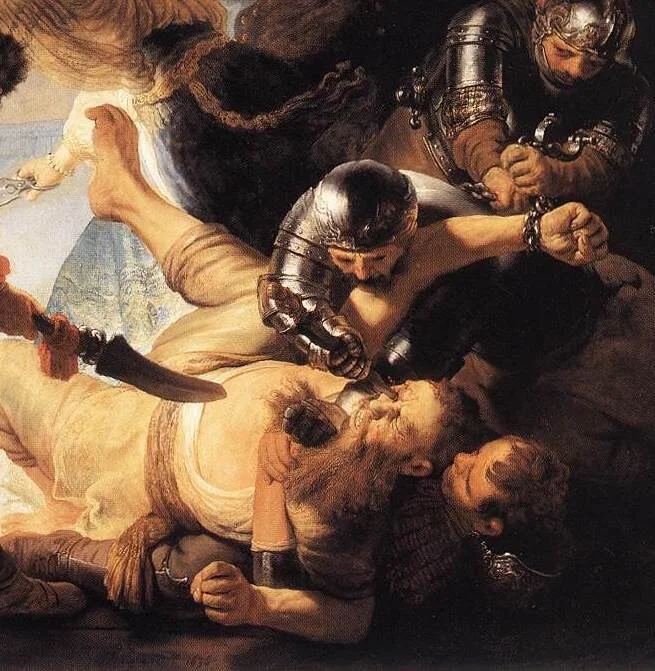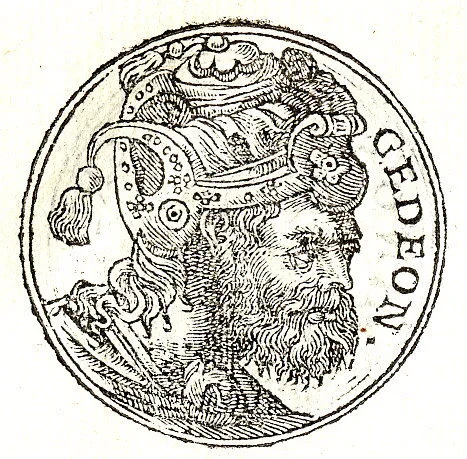Kate Summerscale’s excellent book, The Suspicions of Mr Whicher, is based upon an horrific incident in mid-Victorian England called The Road Hill House Murder. Those studying the mystery are not usually aware of its theological significance. [...]
Lent Series: Judges -- Samson
In comparison with the other Old Testament Judges, it’s easy not to take Samson very seriously. He is no military leader and hardly a willing deliverer of Israel. Instead he is a brawny, brawling, amoral adventurer. A swaggering, audacious Lothario with a penchant for Philistine women. [...]
Lent Series: Judges -- Gideon
Which of you, intending to build an out-house, does not first sit down and estimate the cost, to see whether he has enough to complete it? Well, of course. Prudence is a very British virtue. And which of you, if you were sent down to a riverbank to drink, wouldn’t kneel, and make a cup of your hands, and lift them to your mouth? Well, of course. Decorum is a very British thing, too. [...]
Lent Series: Judges -- Deborah
The Book of Judges describes a period long in Israel’s past, which acts as a bridge between the narratives of Exodus and the conquest and settlement of Canaan on the one hand, and the history of the monarchies of ancient Israel and Judah on the other. There are twelve characters in the book who, we are told, judged Israel, most of whose names we would not now recall, but a few of whom – Deborah, Gideon, Samson, Jephthah – live more easily in our memories because of the stories and songs associated with them. [...]
Christianity: The Basics -- Eucharist
The Eucharist is the Christian story acted out in miniature. The offering of the sinless Son of God for the sinful children of men is not a past event, if by past we mean something over and gone. The incarnate humanity of Christ, offered, sacrificed, risen and ascended, is always part of the Godhead. It is real humanity drawn up into God and eternally representing humanity to God. [...]
Christianity: The Basics -- Baptism
Very often, people talk about how certain things are just “symbolic” or mere “social constructions”. I find this attitude very puzzling, because as far as I can tell, pretty much everything worth caring about is symbolic and socially constructed. Symbolism is about the excess of meaning, about how something means more than it first appears. The 1975 film Jaws is about more than a giant shark terrorising New England beachgoers. [...]
Christianity: The Basics -- Worship
Worship is a word that is difficult for us to define. Often we might think of worship as synonymous with the liturgy, or particular services happening in church. Some use it as a designation for particular parts of a service, the music, for instance: the preacher will give a sermon and then ask the people to stand to 'begin' the time of 'worship', as a group of musicians ascend to the front. [...]
If we knew any Arabic at all, there were two phrases familiar to Malaysian children, regardless of our religious or ethnic background. We woke up every morning to the azan—the call to prayer—which begins with the proclamation that God is great, followed by the affirmation that there is no God but God, and that Muhammad is his prophet. [...]
Christianity: The Basics -- Incarnation, Pt 2: Humanity's Way to God
St Peter's striking words form part of the groundwork for how Christians would understand what our salvation means throughout the centuries. Salvation is not simply forgiveness of sins, or becoming better, more moral, or more generous people. Salvation is a death and a resurrection; “we have died”, Scripture tells us, and now live in Christ (Col 3.3). [...]
Christianity: The Basics -- Incarnation, Pt 1: God speaks
There are many verses of scripture which we could use to introduce the central Christian doctrine of the incarnation, the teaching that, in Jesus of Nazareth, we encounter a person both divine and human. The verse I have chosen begins the Letter to the Hebrews. In many and various ways God spoke to our ancestors through the prophets, but now, in the last days, he has spoken to us in his Son. [...]
Christianity: The Basics -- The Trinity
Each year, the Easter season, stretching from Christ's resurrection to the sending of the Holy Spirit at Pentecost, reminds us afresh that following in the way of Jesus leads us to the deepest, most inconceivable of paradoxes. It reminds us that Jesus reshapes what we mean when we say “God”. [...]
Christianity: The Basics -- God and Creation
There are two ways to approach the Christian doctrine of God: to contemplate the mystery of the Trinity and to ponder the mystery of creation. There is no sense in asking which of these two ways is primary, because Christians are equally committed to both the idea that God is Triune (which is just a fancy of way of saying that God is Three-in-One) and the idea that God is Creator. [...]
Christianity: The Basics -- The Holy Spirit
It is not unusual to think about God primarily by thinking of God the Father. This is, I suppose, what sustains the popularity of the view of God as an old man in the sky, calling all the shots and policing our moral behaviour. Among theologians and philosophers, this way of thinking leads to an emphasis on God’s transcendence: God’s radical otherness from creation. [...]
Christianity: The Basics -- Jesus
Where should I start? My subject is Jesus, deliberately chosen as the first subject in a series about the basics of Christianity. Few things seem more basic about the Christian faith than the claim that it has something to do with Jesus. So here we are. [...]
For the next few weeks, we will be posting a series of short essays on the fundamentals of Christian faith, including Jesus and the Incarnation, the Holy Spirit, the Trinity, Scripture, Baptism, and the Eucharist. These pieces began life as homilies at St Mary Magdalen, Oxford.
This is the third talk at the Learning Christian Living: The Task of Catechesis workshop, which was held at All Saints' Margaret Street on Nov 8 2017. It is on the topic of discipleship, seen as the cultivation of Christian virtues. Fr Jonathan Jong writes about this through a social psychological lens.
This is the second of three talks at the Learning Christian Living: The Task of Catechesis workshop, which was held at All Saints' Margaret Street on Nov 8 2017. Mthr Mel writes about the role of the sermon in catechesis, and how reading, thinking, and praying contribute to the writing of sermons.
This is the first of three talks at the Learning Christian Living: The Task of Catechesis workshop, which was held at All Saints' Margaret Street on Nov 8 2017. Fr Jarred writes on the topic of the beginning of catechesis, and considers the history of catechesis and its nature, and how catechesis is related to evangelism, prayer, Scripture, and virtue.
Downloadable resources from our Learning to Pray series are now available. There are introductions and instructions to the Lord's Prayer, praying the psalms, the Jesus Prayer, Lectio Divina, and the Rosary.
What is the School of Theology?










